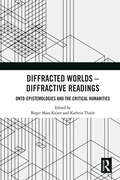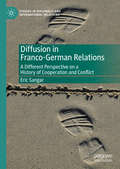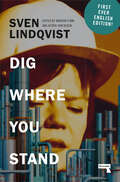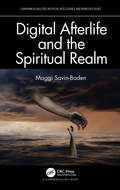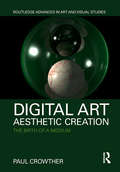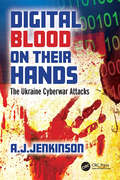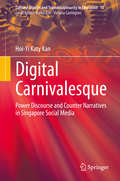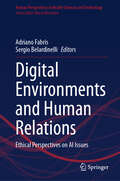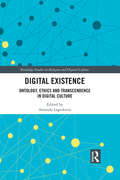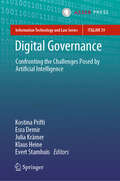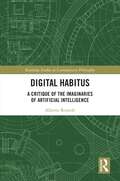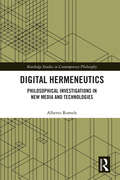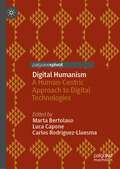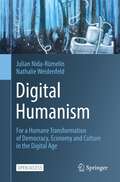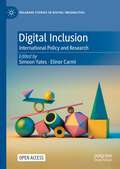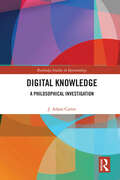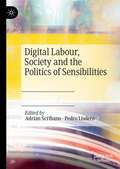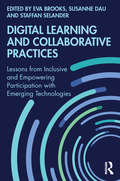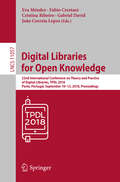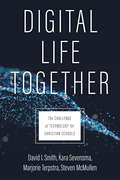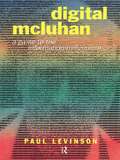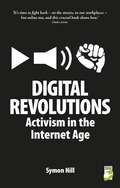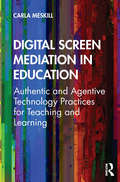- Table View
- List View
Diffracted Worlds - Diffractive Readings: Onto-Epistemologies and the Critical Humanities
by Kathrin Thiele Birgit Mara KaiserDiffraction patterns in quantum physics evidence the fact that the behavior of matter is the result of its entanglements with measurement, or as Karen Barad suggests, the entanglement of matter and meaning. In this sense, therefore, phenomena (including texts, cultural agents, or life forms) are the results of their relational, onto-epistemological entanglements and not individual entities that separately pre-exist their joint becoming. As such, ‘diffraction’ proposes a new understanding of difference: no longer a dualist understanding, but one going beyond binaries. Diffraction is about patterns, constellations, relationalities.From this angle, the book explores ‘diffraction’, which has begun to impact critical theories and humanities debates, especially via (new) materialist feminisms, STS and quantum thought, but is often used without further reflection upon its implications or potentials. Doing just that, the book also pursues new routes for the onto-epistemological and ethical challenges that arise from our experience of the world as relational and radically immanent; because if we start from the ideas of immanence and entanglement, our conceptions of self and other, culture and nature, cultural and sexual difference, our epistemological procedures and disciplinary boundaries have to be rethought and adjusted. The book offers an in-depth consideration of ‘diffraction’ as a quantum understanding of difference and as a new critical reading method. It reflects on its import in humanities debates and thereby also on some of the most inspiring work recently done at the crossroads of science studies, feminist studies and the critical humanities. This book was originally published as a special issue of Parallax.
Diffusion in Franco-German Relations: A Different Perspective on a History of Cooperation and Conflict (Studies in Diplomacy and International Relations)
by Eric SangarThis book analyses and compares instances of the diffusion of political norms and ideas in the history of Franco-German relations. While this relationship is often described as a history evolving from enmity over reconciliation to friendship, the book uses the concept of diffusion as a complementary analytical perspective to emphasize how political norms and ideas originating in one society have influenced the other, especially in periods of intergovernmental conflict. Established in International Relations to explain transnational normative change in contemporary contexts, the framework of diffusion is heuristically useful to explore how various types of actors have contributed, using analytically different mechanisms, to normative change across the Rhine. The book presents eight case studies featuring various contents and mechanisms of ideational diffusion taken from three contexts of Franco-German history, including the French Revolution, the Franco-Prussian War, and Franco-German rapprochement after 1945. Arguing that phenomena that are often seen as genuinely ‘national’ evolutions, such as German nationalism or the French system of primary education, cannot be understood without taking into account the reception and emulation of norms from across the Rhine, the book should help students and scholars to overcome the limits of methodological nationalism when studying bilateral relationships, in the Franco-German context and elsewhere.
Dig Where You Stand: How to Research a Job
by Sven LindqvistOn the 45th anniversary of its initial publication in Swedish, Sven Lindqvist's polemic on history, politics and power is finally available in English for the first time.This volume brings Dig Where You Stand, Sven Lindqvist's classic text on history, power and politics, to English-speaking audiences for the first time.First published in 1978, Dig Where You Stand is a rallying cry for workers to become researchers, to follow the money, take on the role as experts on their job, and "dig" out its hidden histories in order to take a vital step towards social and economic transformation.A how-to guide that inspired an entire movement, it makes the case that everyone – not just academics – can learn how to critically and rigorously explore history, especially their own history, and in doing so find a blueprint for how to transform society for the better.In a world where the balance of power is overwhelmingly stacked against the working-class, Dig Where You Stand's manifesto for the empowerment of workers through self-education, historical research and political solidarity is as important and relevant today as it was in 1978.
Digital Afterlife and the Spiritual Realm (Chapman & Hall/CRC Artificial Intelligence and Robotics Series)
by Maggi Savin-BadenFew religious leaders have examined the potential for the positive impact of digital media and digital immortality creation in religious contexts. It is evident that there have been recent moves away from traditional funeral services focusing on the transition of the deceased into the future world beyond, towards a rise of memorial content within funerals and commemorative events. This has heralded shifts in afterlife beliefs by replacing them, to all intents and purposes, by attitudes to this life. Digital Afterlife and the Spiritual Realm explores the ways in which digital media and digital afterlife creation affects social and religious understandings of death and the afterlife. Features Understands the impact of digital media on those living and those working with the bereaved Explores the impact of digital memorialisation post death Examines the ways in which digital media may be changing conceptions and theologies of death For many people, digital afterlife and the spiritual realm largely remains an area that is both inchoate and confusing. This book will begin to unravel some of this bafflement.
Digital Art, Aesthetic Creation: The Birth of a Medium (Routledge Advances in Art and Visual Studies)
by Paul CrowtherIs art created with computers really art? This book answers ‘yes.’ Computers can generate visual art with unique aesthetic effects based on innovations in computer technology and a Postmodern naturalization of technology wherein technology becomes something we live in as well as use. The present study establishes these claims by looking at digital art’s historical emergence from the 1960s to the start of the present century. Paul Crowther, using a philosophical approach to art history, considers the first steps towards digital graphics, their development in terms of three-dimensional abstraction and figuration, and then the complexities of their interactive formats.
Digital Blood on Their Hands: The Ukraine Cyberwar Attacks
by Andrew JenkinsonCyberattacks are nothing particularly new to the world and Ukraine had suffered many such attacks by Russia over recent years. Russia had knowingly been exploiting Ukraine’s digital vulnerabilities as a proving ground for nearly a decade. Malware such as Sandworm and BlackEnergy had caused untold damage to the Ukrainian population and government previously, which allowed Russia to perfect cyberattacks for further, more global events. Russia had been planting cyber sleeper digital cells for years, especially in the US and the UK. Then, coincidently, the week after the Chinese Winter Olympic games had finished, Russia launched an all-out cyber offensive against 70 Ukrainian government websites. Owing to these being poorly—and insecurely—maintained, they toppled one by one, causing havoc and disruption to the Ukrainian government and to Ukraine’s critical infrastructure. As Q said in James Bond: ‘I can do more damage by breakfast sipping my Earl Grey tea with my keyboard than you ever can in the field.’ Sadly, Q was right, as we witness daily. The keyboard and mouse have indeed become mightier than the sword. The barrage of cyberattacks against Ukraine constitutes the first cyberwar by one nation against another. This attack crossed a very thin red line. That line had the hallmarks of a nation state, but had until now been confined to cyber criminal activities, immaterial of whom the perpetrators were. This, however, was now war. The cyberwar was simply a precursor, the softening of a country that would precede a kinetic war in which tens of thousands of people would lose their lives. This war was the first war for nearly 80 years that rang out deathly klaxons across Europe and the world. Digital Blood on Their Hands addresses the issues that the digital world has created, covering the culpability, causal links and even liabilities that go towards these war crime atrocities, often too frightening to believe and also too compelling to dismiss. It tells a side to the world’s first ever cyberwar that you would never otherwise see or possibly hear about.
Digital Carnivalesque: Power Discourse and Counter Narratives in Singapore Social Media (Cultural Studies and Transdisciplinarity in Education #10)
by Hoi-Yi Katy KanThis book challenges the framing of comedic acts as apolitical and it adopts a multimodal critical discourse approach to interrogate the performance of comedy as a form of power. It proposes using Bakhtin’s carnivalesque as the analytic tool to distil for readers key differences between humour as banal and humour as critical (and political) in today’s social media. Drawing from critical theory and cultural studies, this book takes an interdisciplinary approach in formulating a contemporary view of power that reflects social realities not only in the digital economy but also in a world that is increasingly authoritarian. With the proposition of newer theoretical lenses in this book, scholars and social scientists can then find a way to shift the conversation to uncover the evolving voices of (existing and newer) power holders in the shared digital space; and to view current social realities as a continual project in unpacking and understanding the adaptive ways of the human spirit.
Digital Environments and Human Relations: Ethical Perspectives on AI Issues (Human Perspectives in Health Sciences and Technology #150)
by Adriano Fabris Sergio BelardinelliIn Digital Environments and Human Ecology: New Perspectives on AI Issues, editors and contributors embark on a multidisciplinary exploration of how artificial intelligence (AI) is reshaping the landscapes of human interactions, societal structures, and individual and collective psychologies. Discussing if and to what extent the digital environment can be considered an extension of our environment, this book investigates the profound implications of AI's integration into our daily life, emphasizing the need for a harmonious coexistence between technological advancements and human-centric values, stressing the importance of sustainability in digital development and, therefore, a renewed Human Ecology. By weaving together insights from computer science, social sciences, philosophy, and environmental studies, this book offers a comprehensive and nuanced understanding of the complex relationship between humans and technology. It serves as a vital resource for policymakers, technologists, scholars, and anyone interested in the ethical and ecological implications of digital technologies in our lives.
Digital Existence: Ontology, Ethics and Transcendence in Digital Culture (Routledge Studies in Religion and Digital Culture)
by Amanda LagerkvistDigital Existence: Ontology, Ethics and Transcendence in Digital Culture advances debates on digital culture and digital religion in two complementary ways. First, by focalizing the themes ‘ontology,’ ‘ethics’ and ‘transcendence,’ it builds on insights from research on digital religion in order to reframe the field and pursue an existential media analysis that further pushes beyond the mandatory focus in mainstream media studies on the social, cultural, political and economic dimensions of digitalization. Second, the collection also implies a broadening of the scope of the debate in the field of media, religion and culture – and digital religion in particular – beyond ‘religion,’ to include the wider existential dimensions of digital media. It is the first volume on our digital existence in the budding field of existential media studies.
Digital Governance: Confronting the Challenges Posed by Artificial Intelligence (Information Technology and Law Series #39)
by Klaus Heine Kostina Prifti Esra Demir Julia Krämer Evert StamhuisThis book explores the structure and frameworks of digital governance, focusing on various regulatory patterns, with the aim of tackling the disruptive impact of artificial intelligence (AI) technologies. Addressing the various challenges posed by AI technologies, this book explores potential avenues for crafting legal remedies and solutions, spanning liability of AI, platform governance, and the implications for data protection and privacy. The book is valuable for audiences with or without a technological background. Primarily, it targets academic scholars from a variety of disciplines, including law, ethics, sociology, political science, economics, computer science, and engineering. Particularly, academics interested in interdisciplinary and transdisciplinary studies would benefit from the mixture of disciplines in the book. The scholarly insights in this work are valuable also for policymakers and civil society, by providing potential guidance for effective AI regulation. Additionally, the book can be useful to private companies and organisations that are involved in designing AI applications, offering practical insights and guidance about the legal and societal implications of AI. Kostina Prifti, Esra Demir and Julia Krämer are PhD candidates at Erasmus School of Law, Rotterdam, the Netherlands. Klaus Heine is Professor of Law and Economics at Erasmus School of Law, Rotterdam, the Netherlands. Evert Stamhuis is Professor of Law and Innovation at Erasmus School of Law, Rotterdam, the Netherlands. Chapter 2, Chapter 6, Chapter 10, and Chapter 13 are available open access under a via link.springer.com.
Digital Habitus: A Critique of the Imaginaries of Artificial Intelligence (Routledge Studies in Contemporary Philosophy)
by Alberto RomeleThis book proposes a new theoretical framework for approaching the causes and effects that digital technologies and the imaginaries related to them have on the processes of self-interpretation and subjectivation. It formulates three main theses. First, it argues that today’s digital technologies, which are primarily based on artificial intelligence (AI) algorithms and big data are formidable habitus machines: they offer increasingly personalized services, but these machines are actually indifferent to individuals and their personalities. Second, this book contends that the effectiveness of these machines does not depend solely on their concrete capacity to classify the social world. It also depends on the expectations, hopes, fears, and imaginaries that we have concerning these technologies and their capacities. This cultural habitus—a worldview, or world picture—leads us to believe in the concrete effectiveness of AI and its potential for our societies. Third, the author takes this Bourdieusian notion of habitus and connects it to current “empirical turn” in philosophy of technology. He contends that, by looking too closely at the things themselves, many philosophers of technology have deprived themselves of the possibility to study the symbolic conditions of possibility in which single technological artifacts are always embedded. Digital Habitus will appeal to scholars and students working in philosophy of technology, the ethics of artificial intelligence, media studies, and science and technology studies.
Digital Hermeneutics: Philosophical Investigations in New Media and Technologies (Routledge Studies in Contemporary Philosophy)
by Alberto RomeleThis is the first monograph to develop a hermeneutic approach to the digital—as both a technological milieu and a cultural phenomenon. While philosophical in its orientation, the book covers a wide body of literature across science and technology studies, media studies, digital humanities, digital sociology, cognitive science, and the study of artificial intelligence. In the first part of the book, the author formulates an epistemological thesis according to which the “virtual never ended.” Although the frontiers between the real and the virtual are certainly more porous today, they still exist and endure. In the book’s second part, the author offers an ontological reflection on emerging digital technologies as “imaginative machines.” He introduces the concept of emagination, arguing that human schematizations are always externalized into technologies, and that human imagination has its analog in the digital dynamics of articulation between databases and algorithms. The author takes an ethical and political stance in the concluding chapter. He resorts to the notion of "digital habitus" for claiming that within the digital we are repeatedly being reconducted to an oversimplified image and understanding of ourselves. Digital Hermeneutics will be of interest to scholars across a wide range of disciplines, including those working on philosophy of technology, hermeneutics, science and technology studies, media studies, and the digital humanities.
Digital Humanism: A Human-Centric Approach to Digital Technologies
by Marta Bertolaso Luca Capone Carlos Rodríguez-LluesmaThis book provides an accessible and up to date overview of the foundational issues about both emerging constructive understandings of the digital era and still hidden and ignored aspects that could instead be dramatically relevant in the future, in the process of a technological humanism. The book offers relevant scientific and ethical questions bringing together professionals and researchers, from different professional and disciplinary fields, who have a shared interest in investigating operative aspects of technological, digital and cultural transitions of humans and their capacity of building human societies. The challenges are clear but there is a lack of an epistemological, anthropological, economic and social agenda that would enable a drive to such transitions towards a technological humanism. This book provides an ideal platform for professionals and scholars, not only providing tools for problem analysis, but also indicating shared directions, needs and objectives for a common goal; the creation of new scenarios instead of the creation of fears and manipulated social imaginaria.
Digital Humanism: For a Humane Transformation of Democracy, Economy and Culture in the Digital Age
by Julian Nida-Rümelin Nathalie WeidenfeldThis open access book deals with cultural and philosophical aspects of artificial intelligence (AI) and pleads for a “digital humanism”. This term is beginning to be en vogue everywhere. Due to a growing discontentment with the way digitalization is being used in the world, particularly formulated by former heroes of Internet, social media and search engine companies, philosophical as well as industrial thought leaders begin to plead for a humane use of digital tools. Yet the term “digital humanism” is a particular terminology that lacks a sound conceptual and philosophical basis and needs clarification still – and this gap is exactly filled by this book. It propagates a vision of society in which digitization is used to strengthen human self-determination, autonomy and dignity and whose time has come to be propagated throughout the world. The advantage of this book is that it is philosophically sound and yet written in a way that will make it accessible for everybody interested in the subject. Every chapters begins with a film scene illustrating a precise philosophical problem with AI and how we look at it – making the book not only readable, but even entertaining. And after having read the book the reader will have a clear vision of what it means to live in a world where digitization and AI are central technologies for a better and more humane civilization.
Digital Inclusion: International Policy and Research (Palgrave Studies in Digital Inequalities)
by Simeon Yates Elinor CarmiThis collection presents policy and research that addresses digital inequalities, access, and skills, from multiple international perspectives. With a special focus on the impact of the COVID-19, the collection is based on the 2021 Digital Inclusion, Policy and Research Conference, with chapters from both academia and civic organizations.The COVID-19 pandemic has changed citizens’ relationship with digital technologies for the foreseeable future. Many people’s main channels of communication were transferred to digital services, platforms, and apps. Everything ‘went online’: our families, friends, partners, health, work, news, politics, culture, arts and protesting. Yet access to digital technologies remained highly unequal. This brought digital inclusion policy and research to the fore, highlighting to policymakers and the public the ‘hidden’ challenges and impacts of digital exclusion and inequalities. The cutting-edge volume offers research findings and policycase studies that explore digital inclusion from the provision of basic access to digital, via education and digital literacy, and on to issues of gender and technology. Case studies are drawn from varied sources including the UK, Australia, South America, and Eastern Europe, providing a valuable resource in the pursuit of social equity and justice.This is an open access book.
Digital Knowledge: A Philosophical Investigation (Routledge Studies in Epistemology)
by J. Adam CarterInformation we use to structure our lives is increasingly stored digitally, rather than in biomemory. (Just think: if your online calendar went down, would you know where you are supposed to be and at what time next week?) Likewise, with breakthroughs such as those from Google DeepMind and OpenAI, discoveries at the frontiers of knowledge are increasingly due to machine learning (often, applied to massive datasets, extracted from a fast-growing datasphere) rather than to brainbound cognition. It’s hard to deny that knowledge retention and production are becoming increasingly – in various ways – digitised. Digital Knowledge: A Philosophical Investigation is the first book to squarely and rigorously investigate digital knowledge: what it is, how to make sense of it in connection with received theories of knowledge, and where it is going. Key questions J. Adam Carter examines along the way are the following: How is mere digital information converted into reliable digital knowledge? To what extent can digital knowledge be vindicated against sceptical challenges, and in what ways might digital knowledge stand distinctively subject to defeat? What is the epistemically optimal way for us to decide which tasks to outsource entirely to intelligent machines, and to what extent is further outsourcing appropriate (or not) to verify the results of that same outsourced cognition? Are there any ways in which the expansion of the datasphere threatens to make knowledge less, rather than more, easy to come by? If so, are there any promising ways to safeguard, epistemically, against such threats? Using fascinating examples throughout, such as the recent chess match between Stockfish and Google’s AlphaZero, smartphones and personalisation, Digital Knowledge: A Philosophical Investigation is ideal for researchers investigating this fascinating area of research at the intersection of traditional mainstream epistemology, the philosophy of cognitive science, the philosophy of technology, and computer science.
Digital Labour, Society and the Politics of Sensibilities
by Adrian Scribano Pedro LisderoThis volume provides a multidisciplinary perspective on a set of transformations in social practices that modify the meaning of everyday interactions, and especially those that affect the world of labour. The book is composed of two types of texts: some dedicated to exploring the modifications of labour in the context of the ‘digital age’, and others that point out the consequences of this era and those transformations in the current social structuration processes. The authors examine interwoven possibilities and limitations that act in renewed ways to release/repress the creative energy of human beings, just a few of the potential paths for investigating the connections between work and society that are nowadays involved in the battle of sensibilities.
Digital Learning and Collaborative Practices: Lessons from Inclusive and Empowering Participation with Emerging Technologies
by Eva Brooks Staffan Selander Susanne DauDigital Learning and Collaborative Practices offers a comprehensive overview of design-based, technology-enhanced approaches to teaching and learning in virtual settings. Today’s digital communications foster new opportunities for sharing culture and knowledge while also prompting concerns over division, disinformation and surveillance. This book uniquely emphasises playful, collaborative experiences and democratic values in a variety of environments—adaptive, augmented, dialogic, game-based and beyond. Graduate students and researchers of educational technology, the learning sciences and interaction design will discover rich theories, interventions, models and approaches for concretising emerging practices and competencies in digital learning spaces.
Digital Libraries for Open Knowledge: 22nd International Conference on Theory and Practice of Digital Libraries, TPDL 2018, Porto, Portugal, September 10–13, 2018, Proceedings (Lecture Notes in Computer Science #11057)
by Fabio Crestani Eva Méndez Cristina Ribeiro Gabriel David João Correia LopesThis book constitutes the proceedings of the 22nd International Conference on Theory and Practice of Digital Libraries, TPDL 2018, held in Porto, Portugal, in September 2018. The 51 full papers, 17 short papers, and 13 poster and tutorial papers presented in this volume were carefully reviewed and selected from 81 submissions. The general theme of TPDL 2018 was Digital Libraries for Open Knowledge. The papers present a wide range of the following topics: Metadata, Entity Disambiguation, Data Management, Scholarly Communication, Digital Humanities, User Interaction, Resources, Information Extraction, Information Retrieval, Recommendation.
Digital Life Together: The Challenge of Technology for Christian Schools
by David I. Smith Steven McMullen Kara Sevensma Marjorie TerpstraDigital technologies loom large in the experience of today&’s students. However, parents, teachers, and school leaders have only started to take stock of the ramifications for teaching, learning, and faith. Based on a three-year in-depth study of Christian schools, Digital Life Together walks educators, school leaders, and parents through some of the big ideas that are hidden in our technology habits, going beyond general arguments for or against digital devices to address the nuanced realities of Christian education in a twenty-first-century context.
Digital Life Together: The Challenge of Technology for Christian Schools
by David I. Smith Steven McMullen Kara Sevensma Marjorie TerpstraDigital technologies loom large in the experience of today&’s students. However, parents, teachers, and school leaders have only started to take stock of the ramifications for teaching, learning, and faith. Based on a three-year in-depth study of Christian schools, Digital Life Together walks educators, school leaders, and parents through some of the big ideas that are hidden in our technology habits, going beyond general arguments for or against digital devices to address the nuanced realities of Christian education in a twenty-first-century context.
Digital McLuhan: A Guide to the Information Millennium
by Paul LevinsonMarshall McLuhan died on the last day of 1980, on the doorstep of the personal computer revolution. Yet McLuhan's ideas anticipated a world of media in motion, and its impact on our lives on the dawn of the new millennium.Paul Levinson examines why McLuhan's theories about media are more important to us today than when they were first written, and why the Wired generation is now turning to McLuhan's work to understand the global village in the digital age.
Digital Revolutions
by Symon HillFrom Occupy to Uncut, from the Arab Spring to the Slutwalk movement, few questions about recent activism raise as much controversy as the role of the internet. This book suggests that the internet is a tool, not a cause, of social change. It has profoundly affected the way people communicate, making it easier to find the truth, to learn from activists on the other side of the world, to co-ordinate campaigns without hierarchy and to expose governments and corporations to public ridicule. But it has also helped those same governments and corporations to spy on activists, to disrupt campaigns and to create illusions of popular support.Focused on the real-life experiences of activists rather than theory or abstract statistics, Digital Revolutions asks how the internet has affected activism, how it has allowed movements to go global more quickly and what the future holds for corporations and social movements that are doing battle online.Symon Hill has campaigned on the arms trade, religious liberty, same-sex marriage, disability rights, and economic injustice. He has worked with the Campaign Against Arms Trade and the Fellowship of Reconciliation, and was a founding member of Christianity Uncut. He has trained hundreds of activists in campaigning skills and media engagement. In February 2012 he was dragged by police from the steps of St. Paul's Cathedral during the eviction of Occupy London Stock Exchange. He is associate director of the Ekklesia think tank and associate tutor at the Woodbrooke Quaker Study Centre. He writes for The Guardian, Morningstar, The Friend, and Third Way. His first book was The No-Nonsense Guide to Religion.
Digital Screen Mediation in Education: Authentic and Agentive Technology Practices for Teaching and Learning
by Carla MeskillDigital Screen Mediation in Education explores the complex role of visual mediation in today’s digitally enhanced classrooms. While the notion that technology tools have agency—that they act to induce learning—pervades contemporary conversations about pedagogy, this unique volume reframes instructional agency around teachers. The book’s theoretically reinforced and multidisciplinary approach to enhancing effective instruction with screen-based technologies spans aesthetics, technical knowledge, teacher empowerment, social media, and beyond. Researchers in educational technology, instructional design, online learning, and digital pedagogies as well as prospective and practicing educators will find a rigorous treatment of how skilled, thoughtful teaching with, through, and around digital screens can bring about successful learning outcomes.
Digital Stockholm Syndrome in the Post-Ontological Age (Forerunners: Ideas First)
by Mark JarzombekOnce, humans were what they believed. Now, the modern person is determined by data exhaust—an invisible anthropocentric ether of ones and zeros that is a product of our digitally monitored age. Author Mark Jarzombek argues that the world has become redesigned to fuse the algorithmic with the ontological, and the discussion of ontology must be updated to rethink the question of Being. In Digital Stockholm Syndrome in the Post-Ontological Age, Jarzombek provocatively studies the new interrelationship between human and algorithm. Forerunners is a thought-in-process series of breakthrough digital works. Written between fresh ideas and finished books, Forerunners draws on scholarly work initiated in notable blogs, social media, conference plenaries, journal articles, and the synergy of academic exchange. This is gray literature publishing: where intense thinking, change, and speculation take place in scholarship.
